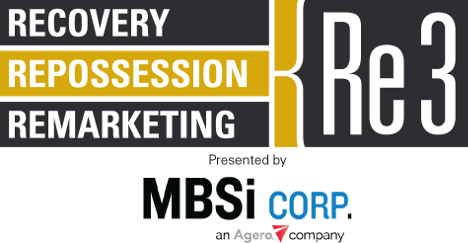The next online continuing education offering from risk management and training provider Recovery Industry Services Company (RISC) is geared to prepare recovery agency owners and agents to comply with federal regulations for protecting consumers’ nonpublic personal information (NPPI).
In addition to covering Gramm-Leach-Bliley Act requirements specific to third-party disclosure of NPPI, the new course also examines the growing role of social media in the repossession process.
RISC highlighted the course is priced at $49 through April 7, a discount of 50 percent off regular pricing.
“Professionals in the collateral recovery industry face an array of complex and fast-changing challenges, from rising insurance rates to lender compliance mandates and federal consumer protection regulations,” said RISC president Stamatis Ferarolis, a licensed training instructor for collateral recovery specialists across the nation.
“In such an environment, it’s critical that recovery agents and agency owners continually advance their knowledge and understanding of the latest industry developments,” Ferarolis continued.
The CE 11 course provides recommended procedures for protecting NPPI from unauthorized third-party disclosure during the repossession process, specifically relating to address verification (residence and place of employment), contact procedure (other than debtor) and skip-tracing.
Additionally, the course outlines how social media can affect the repossession process, such as:
• Potentially violating an individual’s privacy rights through the disclosure and/or dissemination of personal and/or disparaging information online.
• Determining insurability, in part, through a review of an individual’s social media postings, including comments and photos.
Ferarolis pointed out RISC’s suite of continuing education courses has been developed to comply with Consumer Financial Protection Bureau and finance company mandates across a range of specialty areas, including field recovery procedures, data security and the Uniform Commercial Code.
All courses are offered 100% online, including final testing, and a certificate is issued upon successful completion of each of the 11 continuing education courses. The training provided is applicable in all 50 U.S. states and Puerto Rico.
“Our goal in developing certification and Continuing Education courses is to ensure collateral recovery professionals continue to serve their clients effectively, while complying with state and federal regulations that impact the repossession process,” said Ferarolis, co-author of the Field Recovery Specialist Operations Manual.
To learn more about RISC’s continuing education programs and other services, e-mail [email protected], call (866) 996-7472 or visit www.RiscUS.com.
With debt collection continuing to be one of the primary triggers, the Consumer Financial Protection Bureau’s latest update about its complaint database indicated the bureau has handled approximately 1,080,700 consumer complaints across all products as of Jan. 1.
For December, the CFPB reported that debt collection again was the most-complained-about financial product or service. Of the approximately 23,000 complaints handled in December, there were 7,196 complaints about debt collection.
The second most-complained-about consumer product was credit reporting, which accounted for 3,837 complaints. The third most-complained-about financial product or service was mortgages, accounting for 3,762 complaints.
Agency officials noticed Alaska, Georgia, and Louisiana experienced the greatest year-to-year complaint volume increases from October to December versus the same time period 12 months earlier. The data showed Alaska was up 57 percent, Georgia climbed 46 percent and Louisiana rose 32 percent.
The CFPB added the top three companies that received the most complaints from August through October of last year were Equifax, Wells Fargo, and TransUnion.
The bureau’s latest update also highlighted complaints from Tennessee. As of Jan. 1, the CFPB tabulated that consumers in Tennessee submitted 17,800 of the 1,080,700 complaints the bureau has handled.
Of those complaints, 4,700 and 5,800 have come from consumers in the Memphis and Nashville metro areas respectively.
Consumers in Tennessee most often submitted complaints about debt collection. Officials found that debt collection complaints accounted for 34 percent of the complaints submitted to the bureau by consumers from Tennessee, while nationally debt collection complaints account for 27 percent of complaints.
Equifax, Experian and TransUnion were the most-complained-about companies for consumers in Tennessee.
This week, the Cause of Action Institute filed a lawsuit in the U.S. District Court for the District of Columbia to compel the Consumer Financial Protection Bureau to provide records the agency used in formulating its rule to prohibit the use of mandatory binding arbitration clauses in financial services contracts.
Cause of Action Institute claims to be a non-profit, nonpartisan government accountability organization that “fights to protect economic opportunity when federal regulations, spending and cronyism threaten it.”
The organization insisted that prohibiting the use of third-party arbitration in financial contracts would subject numerous financial institutions to a flood of class action lawsuits, further burdening the courts and ultimately injuring consumers by increasing the costs associated with bank loans and other financial services. Officials added the CFPB’s proposed rule was largely based on a study commissioned by the agency in 2015.
“To issue a regulation affecting such a vast swath of the economy, and then attempt to conceal the bulk of the documents reflecting how that decision was made from public view, violates the law and the American people’s right to know,” Cause of Action Institute vice president John Vecchione said.
In April, the Cause of Action Institute filed a Freedom of Information Act (FOIA) request for records that would show how the agency conducted its study. Although CFPB produced some documents, the institute said the agency withheld a large number of responsive records and information.
In September, officials recapped that the CFPB issued a final determination, indicating the agency would withhold 1,877 pages of responsive records. The Cause of Action Institute appealed the CFPB’s determination and challenged each FOIA exemption the agency applied to the production.
Last month, the CFPB denied the appeal.
In its lawsuit, the Cause of Action Institute argues that CFPB is required to produce all responsive records not covered by a valid exemption.
“The burden is on the agency to justify the use of any exemption to withhold or redact information, which CFPB has failed to do,” the Cause of Action Institute said. “The lawsuit compels the agency to produce all records improperly withheld within 20 business days of the court’s order.
The full lawsuit can be found here.
ACA International, the association of credit and collection professionals, released a new white paper this week.
The paper titled, “Business Practices and Capabilities within the Debt Collection Industry,” examines the potential impact of additional Consumer Financial Protection Bureau regulatory measures on member organizations and the debt collection industry.
“The Small Business Administration Office of Advocacy defines a small business as either ‘an independent business having fewer than 500 employees,’ or one that generates annual receipts that do not exceed the SBA size standard; for debt collection companies, the size standard is $15 million in average annual receipts,” ACA International director of research Josh Adams wrote in the white paper.
“Most debt collection companies (78 percent) qualify as small businesses based on both criteria,” Adams continued.
Adams mentioned that the CFPB reported that modifying data management systems would cost between $1,000 and $2,800 for small collection agencies. In the white paper, ACA International estimates the cost of upgrading the data management systems or modifying the software systems for additional functionality to be $73,339 for a small collection agency.
The estimated cost of including an additional page of disclosures in conjunction with a validation notice in mailed communications for a small collection agency would be an average annual increase of $95,405 in additional mailings.
“When compared to the findings of the CFPB report on the operations of third-party debt collection firms, this analysis suggests that the CFPB substantially underestimates the financial impact of new rules on these businesses,” Adams wrote.
ACA International’s latest white paper is part of an ongoing research initiative to collect more original data about the credit and collection industry, and quantify how debt collectors help consumers and the overall economy.
This white paper can be downloaded here.
A preview of some of the enlightening discussions on tap for this year’s Re3 Conference presented by MBSi Corp. is scheduled for the final edition of Used Car Week Live.
The online video event set for 2 p.m. ET next Thursday will include Cort DeHart, who is both vice president of business development at Agero and corporate strategy manager at MBSi Corp., and Jonna Boyle, director at New Oak Capital.
They’ll be joining SubPrime Auto Finance News and BHPH Report senior editor Nick Zulovich for a conversation about how the Consumer Financial Protection Bureau updated its compliance bulletin on service providers, which can include skip-tracers, repossession agents and other firms that provide assistance during the recovery process.
To recap, according to what the CFPB published through the Federal Register late last month, an amendment was needed to clarify that supervised entities have flexibility, allowing for appropriate risk management of service providers.
Before taking on his current position, DeHart was a co-founder of Digital Recognition Network and presided as chief executive officer for four years.
Boyle served in compliance positions at both SFG Finance and Santander Consumer USA before embarking on her current consulting endeavors. She also is a board member of the National Automotive Finance Association.
You can watch the video live or on-demand by going to Used Car Week’s presence on Facebook at www.facebook.com/usedcarweek.
And it’s not too late to join the other finance company executives and repossession industry service providers and experts who will be mingling during the Re3 Conference on Nov. 16. It’s the midpoint of Used Car Week, which unfolds at the Red Rock Casino, Resort and Spa in Las Vegas.
For more details, go to www.usedcarweek.biz.
On Wednesday, the Consumer Financial Protection Bureau updated its compliance bulletin on service providers, which can include skip-tracers, repossession agents and other firms that provide assistance during the recovery process.
According to what the CFPB published through the Federal Register, an amendment was needed to clarify that supervised entities have flexibility, allowing for appropriate risk management of service providers.
“The bureau is re-issuing its guidance on service providers to clarify that the depth and formality of the risk management program for service providers may vary depending upon the service being performed — its size, scope, complexity, importance and potential for consumer harm — and the performance of the service provider in carrying out its activities in compliance with federal consumer financial laws and regulations,” CFPB officials said.
“This amendment is needed to clarify that supervised entities have flexibility and to allow appropriate risk management,” they continued.
Also in the update, the CFPB reiterated how to limit the potential for statutory or regulatory violations and related consumer harm. The agency stated supervised banks and nonbanks can take steps to ensure that their business arrangements with service providers do not present unwarranted risks to consumers.
Officials insisted these steps should include, but are not limited to:
• Conducting thorough due diligence to verify that the service provider understands and is capable of complying with Federal consumer financial law.
• Requesting and reviewing the service provider’s policies, procedures, internal controls and training materials to ensure that the service provider conducts appropriate training and oversight of employees or agents that have consumer contact or compliance responsibilities.
• Including in the contract with the service provider clear expectations about compliance, as well as appropriate and enforceable consequences for violating any compliance-related responsibilities, including engaging in unfair, deceptive, or abusive acts or practices.
• Establishing internal controls and ongoing monitoring to determine whether the service provider is complying with federal consumer financial law.
• Taking prompt action to address fully any problems identified through the monitoring process, including terminating the relationship where appropriate.
The complete update in the Federal Register can be reviewed here.
The latest enforcement action handed out by the Consumer Financial Protection Bureau was again focused on debt collection. This time, the action involved Navy Federal Credit Union.
The bureau specified four activities deemed to be improper debt collection actions that triggered a $28.5 million penalty. The CFPB charged Navy Federal Credit Union with these infractions:
1. Falsely threatened legal action and wage garnishment
Bureau officials said the credit union sent letters to members threatening to take legal action unless they made a payment. But in reality, the CFPB said the institution seldom took any such actions.
The CFPB found that the credit union’s message to consumers of “pay or be sued” was inaccurate about 97 percent of the time, even among consumers who did not make a payment in response to the letters. The bureau asserted the credit union’s representatives also called members with similar verbal threats of legal action. And the credit union threatened to garnish wages when it had no intention or authority to do so.
2. Falsely threatened to contact commanding officers to pressure servicemembers to repay
The regulator indicated the credit union sent letters to dozens of servicemembers threatening that the credit union would contact their commanding officers if they did not promptly make a payment. The CFPB added that the credit union’s representatives also communicated these threats by telephone.
For members of the military, officials explained consumer credit problems can result in disciplinary proceedings or lead to revocation of a security clearance. They added the credit union was not authorized and did not intend to contact the servicemembers’ chains of command about the debts it was attempting to collect.
3. Misrepresented credit consequences of falling behind on a loan
The CFPB indicated the credit union sent about 68,000 letters to members misrepresenting the credit consequences of falling behind on a Navy Federal Credit Union loan. Many of the letters said that consumers would find it “difficult, if not impossible” to obtain additional credit because they were behind on their loan. But the credit union had no basis for that claim, as it did not review consumer credit files before sending the letters.
The regulator went on to mention the credit union also misrepresented its influence on a consumer’s credit rating, implying that it could raise or lower the rating or affect a consumer’s access to credit. As a furnisher, the credit union could supply information to the credit reporting companies but it could not determine a consumer’s credit score.
4. Illegally froze members’ access to their accounts
Bureau officials also mentioned the credit union froze electronic account access and disabled electronic services for about 700,000 accounts after consumers became delinquent on a Navy Federal Credit Union credit product. This meant delinquency on a loan could shut down a consumer’s debit card, ATM, and online access to the consumer’s checking account.
The only account actions consumers could take online would be to make payments on delinquent or overdrawn accounts, according to the CFPB.
According to the CFPB’s news release, Navy Federal Credit Union is correcting its debt collection practices and will pay roughly $23 million in redress to victims along with a civil money penalty of $5.5 million.
“Navy Federal Credit Union misled its members about its debt collection practices and froze consumers out from their own accounts,” CFPB director Richard Cordray said. “Financial institutions have a right to collect money that is due to them, but they must comply with federal laws as they do so.”
For much of the summer, Re3 Conference panel discussion moderator and Intellaegis president John Lewis has been dissecting the debt collection regulation proposal released by the Consumer Financial Protection Bureau. Lewis compiled a three-segment blog series on Intellaegis’ website, portions of which are on tap to be discussed during this week’s episode of Used Car Week Live on the conference’s Facebook page.
Lewis raised dozens of questions about how the CFPB is going to interpret current statutes — or perhaps even champion a revamp of the Fair Debt Collection Practices Act (FDCPA) that was originally finalized back in 1977. In one of the posts, Lewis made a statement perhaps anyone in an auto finance company’s collection department might make: “One live contact per week, really?”
Lewis insisted that finance companies need to closely monitor and catalogue any attempts to reach defaulted contract holders, which can include efforts in the field by a repossession agent.
“For example, if early stage collection accounts are assigned to a loan servicer, or later stages assigned to a skip tracing firm or post charge off assigned to a collection agency or even a debt buyer, then the first-party lender needs to be using a central repository software that tracks and logs this in an easily auditable format,” Lewis said.
“So, if the customer calls the first-party lender, then the first-party must notify the third-party that contact with the customer has been made and they are not allowed to make or receive calls for a week,” he continued.
Should the CFPB choose to leverage penalties that are possible through the Telephone Consumer Protection Act (TCPA), Lewis pointed out the fine could be $500 per incident if regulators deemed it to be accidental or up to $1,500 per occurrence if determined to be intentional.
“Not having the technology to track these rules does not appear to be an excuse for accidentally,” Lewis said.
In another Intellaegis blog entry, Lewis reiterates a segment of what the CFPB released back in May, which stated:
“The proposal under consideration would require subsequent debt collectors to obtain (and prior collectors to provide) certain information consumers provided to prior collectors that obligates collectors to take or refrain from taking certain action relating to rights arising under certain substantive provisions of the FDCPA and the proposals under consideration.”
Lewis considered the implications of this part of the CFPB proposal.
“To me, this states that all work on any account must be transparent and available to anyone working the account, and that information must be in a system everyone can access, or in systems interfaced where notes and activity from one collector are available to be seen by another collector, even when they work for competing companies,” Lewis said.
“This will be interesting as not every company competes fairly, so will companies document false information to throw their competitor off track? As regulatory compliance weeds out the unscrupulous bad actors in the industry, one would hope that the level of professionalism will rise to a higher standard where everyone will work together in a fair and honest manner, and those who do not will be caught and penalized,” he went on to say.
Lewis’ entire blog series can be found here.
Lewis will also be a part of the Used Car Week Live conversation about this topic and more with conference chair Bill Zadeits and Nick Zulovich, senior editor of SubPrime Auto Finance News and BHPH Report. Used Car Week Live is set to 1 p.m. ET on Thursday and can be seen at www.facebook.com/UsedCarWeek.
Furthermore, Lewis will be hosting his own free webinar with two other experts who are planning to be part of Used Car Week. Lewis will welcome Stephanie Alsbrooks, chief executive officer of defi SOLUTIONS, and Mark Floyd, the former CEO of Exeter Finance and current president of the National Automotive Finance Association. Space is limited for the webinar titled “How to Handle New CFPB Rules In 2017,” which is set for Sept. 22 at 3 p.m. ET.
Registration for the webinar can be completed here.
And for even more discussion about collections, repossessions and recoveries, the Re3 Conference at Used Car Week will bring together more than a dozen experts. The Re3 Conference is set for Nov. 16 at the Red Rock Resort and Casino in Las Vegas. More details can be found at re3.autoremarketing.com.
Autotrader senior analyst Michelle Krebs scanned several recent headlines, which included a Volkswagen engineer pleading guilty for his role in a conspiracy to cheat U.S. emissions tests as well as Wells Fargo agreeing to a record fine from the Consumer Financial Protection Bureau. Krebs then arrived at a succinct conclusion.
“The feds are cracking down hard on companies for cheating of all kinds as of late,” she said in a message to media outlets, including Auto Remarketing.
According to a press release from the Department of Justice, Volkswagen engineer James Robert Liang pleaded guilty on Friday for his role in a nearly 10-year conspiracy to defraud U.S. regulators and the automaker’s U.S. customers by implementing software specifically designed to cheat U.S. emissions tests in hundreds of thousands of Volkswagen “clean diesel” vehicles.
Justice Department officials said Liang’s plea agreement provides that he will cooperate with the government in its ongoing investigation.
Liang, of Newbury Park, Calif., pleaded guilty today to one count of conspiracy to defraud the United States, to commit wire fraud and to violate the Clean Air Act. He was indicted under seal on June 1 by a federal grand jury, and the indictment was unsealed on Friday.
According to the plea agreement, from 1983 until May 2008, Liang was an employee of VW, working in its diesel development department in Wolfsburg, Germany. Liang admitted that beginning in about 2006, he and his co-conspirators started to design a new “EA 189” diesel engine for sale in the United States According to Liang’s admissions, when he and his co-conspirators realized that they could not design a diesel engine that would meet the stricter U.S. emissions standards, they designed and implemented software to recognize whether a vehicle was undergoing standard U.S. emissions testing on a dynamometer or being driven on the road under normal driving conditions (the defeat device), in order to cheat the emissions tests.
Officials said Liang admitted that he used the defeat device while working on the EA 189 and assisted in making the defeat device work. In May 2008, Liang moved to the United States to assist in the launch of VW’s new “clean diesel” vehicles in the U.S. market, according to the plea agreement. While working at VW’s testing facility in Oxnard, Calif., he has held the title of leader of diesel competence.
According to the plea agreement, employees of VW and its U.S. subsidiary met with the EPA and the California Air Resources Board (CARB) to seek the certifications required to sell each model year of its vehicles to U.S. customers. Liang admitted that during some of these meetings, which he personally attended, his co-conspirators misrepresented that VW diesel vehicles complied with U.S. emissions standards and hid the existence of the defeat device from U.S. regulators.
Jack Nerad, executive editorial director and executive market analyst for Kelley Blue Book’s KBB.com, asked a question after seeing the Justice Department’s announcement.
“The guilty plea by Volkswagen engineer James Liang begs the question: will there be other indictments in the case? By his own testimony, Liang didn’t work alone, so there is a strong possibility of other indictments and possibly a conspiracy indictment that could affect a much broader swath of VW engineers and management,” Nerad said.
“The question remains how high on the executive chain the investigation will discover wrongdoing,” he continued. “At the same time, this scandal has evolved into criminal proceedings, the car-buying public has demonstrated few changes in behavior toward the Volkswagen brand in the United States.
“Given the short memory of the buying public, the scandal is unlikely to have far-reaching effects on VW sales, but for the moment it is a major distraction,” Nerad continued.
Meanwhile a couple of days earlier, the CFPB handed out a $100 million penalty to Wells Fargo for activities not related to auto financing — rather, what the regulator deemed to be “widespread illegal practice of secretly opening unauthorized deposit and credit card accounts.”
Spurred by sales targets and compensation incentives, the bureau said employees boosted sales figures by “covertly” opening accounts and funding them by transferring funds from consumers’ authorized accounts without their knowledge or consent, often racking up fees or other charges.
Krebs summarized the events this way:
“(The) plea by a Volkswagen engineer involved with the diesel emissions cheating scandal — unlikely the last plea we’ll see from this debacle — comes on the heels of Wells Fargo firing 5,300 employees for setting up phony bank accounts and the revelation that Fiat Chrysler executive Reid Bigland is being investigated for possibly cheating on sales reports,” she said.
“These events should serve as a warning to all companies to make sure they are operating on the up-and-up, because the feds are showing no mercy,” Krebs went on to say.
Re3 Conference panel discussion moderator and Intellaegis president John Lewis needed some time to comb through the debt collection regulation proposal released by the Consumer Financial Protection Bureau about two weeks ago.
While much of the CFPB’s latest material is geared toward third-party collections, Lewis cautioned repossession companies that are already struggling to maintain compliance demands given by their auto finance company clients.
To recap quickly, the CFPB explained its proposals under consideration would overhaul the debt collection market by capping collector contact attempts and by helping to ensure that companies collect the correct debt.
“I know small repo companies that went out of business as they lost contracts due to the oversight of scared lenders making them jump through hoops over things they thought they would have to monitor when the CFPB finally addressed debt collection,” Lewis said in a blog post on his company website.
“Sadly, rules like these new ones really don’t apply much to some small debt collection industries, like repossession for instance, other than their notes need to flow between other companies working the same accounts they work,” he continued. “Until there is more clarity from the CFPB, nothing will stop first-party lenders from mandating so many new rules on these small players that many good repo companies will be forced out due to their inability to afford the resources to keep up.
“One first-party auto lender, the largest I believe, actually recognized this in 2016 and they raised fees to repo companies, so some are taking a leadership role,” Lewis went on to say.
Lewis closed his blog post by drawing on his industry experience.
“The proposed rules are the most significant change the collection industry has seen in the 30 years I’ve been involved in collections, and as is the case with these regulatory boards, both state and federal, it seems to just be the start of what’s to come,” he said.
To help finance companies, repossession agent and other service providers abide by what’s coming down the regulatory highway, Used Car Week has two events on tap designed to help those players — the SubPrime Forum and the Re3 Conference. Used Car Week runs from Nov. 14-18 at the Red Rock Resort and Casino in Las Vegas.
For a look at the experts such as Lewis who are scheduled to appear at Used Car Week, go to our Agenda page here.












